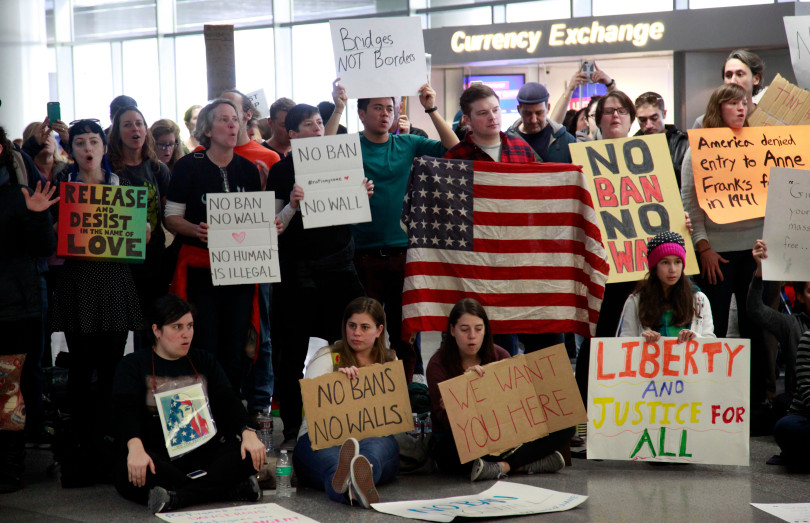By Tiela Chalmers
On a freezing morning in early January, more than one thousand attorneys gathered in Bill Graham Auditorium for the How to be a Good Ally: A Strategic Engagement Conference to learn more about the legal challenges we could be facing in the next four years under the Trump Administration, and how those interested could get involved. This event inspired the following series of blog posts on immigration, hate crimes, and LGBT rights.
Immigration
Immigration is an arena in which the president has power to act through executive action or through policies passed on to government agencies. President Trump has already instructed the Department of Homeland Security to commence immediate construction of a 1,900-mile long wall along the southern border with Mexico using existing federal funds to get it started, and has ordered immediate exclusion of everyone from seven “Muslim” countries.

On day six of his presidency, President Trump announced plans to deport undocumented immigrants, tripling resources for enforcement with 10,000 additional immigration officers. It also targets “sanctuary cities” by withholding funding. There are ICE agents who have announced that they will begin to raid workplaces and public establishments (an approach not used even during the Obama administration, which was actually fairly active in deportations.) For a more in-depth look at the Executive Orders so far, check out CNN’s coverage.
The ACLU is suing the Trump Administration, accusing him of constitutional and legal overreach after hundreds of immigrants were detained at airports across the nation, and more were stranded overseas. Large crowds of protesters turned out at airports around the nation to denounce the ban.
Federal judges have blocked part of the president’s actions, preventing the deportation of some arrivals, but the order stopped short of letting them into the country or issuing a broader ruling on the constitutionality.
California law prohibits discrimination based on immigration status, and this extends to protecting employees and customers from harassment by ICE. But there will be many challenges, including in California, as it is of course federal law that governs the deportation and status proceedings. In addition, some feel that California’s successful inclusion of immigrant communities (in contrast to the anti-immigrant culture present even just 20 years ago) is a real threat to this new administration.
What can we do now?
As of Sunday evening, SFO and Oakland airports are covered and non-immigration volunteer attorneys are not needed. Reports from One Justice are that there are no detainees at Oakland International. As protests continue there may be need for volunteer attorneys to be legal observers. I’ve signed up for updates on the statewide immigration pro bono response coordination organized by One Justice at www.onejustice.org/immigration. I encourage you to as well.
In terms of what can be done now, there is an effort underway to build out the infrastructure of rapid response, including training pro bono attorneys, trying to put in place funding for greatly expanded legal services, doing “know your rights” seminars in immigrant communities, and protecting sanctuary city policies. Defunding sanctuary cities would require congressional action, and so would take longer to implement.
This legal debate will involve liberals perhaps taking the opposite position from that we took in response to Arizona’s immigration laws, passed in 2010. Then, liberals emphasized that federal law preempts state regulation with respect to immigration. Conservatives, of course, argued states’ rights. Now, liberals will be arguing that the federal government cannot cut unrelated funding to the states just because they have pro-immigrant policies – while the conservatives will be pushing the preemption argument.
Those immigrants who have a route to becoming documented are urged to file applications now, before any more doors start closing. In addition, of course, the immigration law community is still dealing with the unaccompanied minor crisis that has been unfolding for the last year.
Tiela Chalmers is the CEO and General Counsel of the Alameda County Bar Association the Volunteer Legal Services Corporation. Tiela has been a consultant in the fields of legal services and pro bono, handling projects including coordinating the Shriver Housing Project in Los Angeles, the largest of the “civil Gideon” pilot projects in California, and working with the ABA and a national working group on updating the Pro Bono Standards. Previously the Executive Director of Volunteer Legal Services Program in San Francisco, Tiela worked at VLSP for many years with Tanya Neiman until her death. Prior to VLSP, Tiela was an attorney at Farella, Braun + Martel in San Francisco.

